
Proton Holdings Berhad, commonly known as Proton, is a Malaysian multinational automotive company. Proton was established on May 7, 1983, as Malaysia's sole national budget car company until the advent of Perodua in 1993. The company is headquartered in Shah Alam, Selangor, and operates additional facilities in Proton City, Perak.

Perusahaan Otomobil Kedua Sendirian Berhad, usually abbreviated to Perodua, is Malaysia's largest car manufacturer, followed by Proton Holdings.

The Proton Waja is a saloon car manufactured by Malaysian automotive company, Proton, it was launched in May 2000 by fourth Prime Minister Mahathir Mohamad.

The Proton Saga is a series of subcompact cars and currently city cars produced by Malaysian automobile manufacturer Proton. Introduced in 1985, the Proton Saga became the first Malaysian car and a major milestone in the Malaysian automotive industry. The Saga is Proton's longest-running and best-selling nameplate, with over 1.9 million units sold worldwide over 37 years.
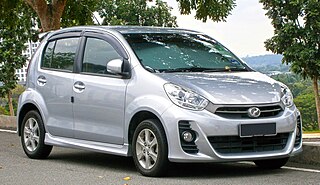
The Perodua Myvi is a subcompact car/supermini (B-segment) produced by the Malaysian manufacturer Perodua since 2005. Based on the Daihatsu Boon, the Myvi is the result of Perodua's collaboration with both Toyota and Daihatsu. However, the third generation Myvi was entirely designed and made in Malaysia, thus not being based on the third generation Boon. The Myvi was the best-selling car in Malaysia for nine consecutive years, between 2006 and 2014, and again between the years 2018 and 2022. The Myvi has been Malaysia's best-selling car for 14 years since its first full year of sales in 2006. As of 2023, the Myvi reached 1.4 million units sold since the launch of its first generation in 2005.
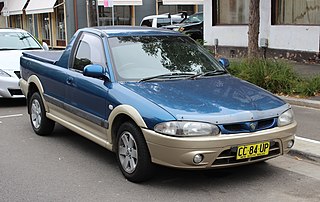
The Proton Arena is a small front wheel drive coupé utility manufactured by Malaysian automaker Proton. Introduced in 2002, the Arena is the only form of pickup by Proton, and is the only Proton model to enjoy significantly more popularity in its export market than domestically.
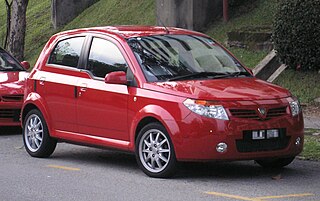
The Proton Savvy is a supermini hatchback produced by Malaysian carmaker Proton. The car was introduced in June 2005, as an indirect successor to Proton Tiara. It was discontinued in 2013 due to slow sales compared to the Perodua Myvi.
The Australasian New Car Assessment Program (ANCAP) is a car safety performance assessment programme based in Australia and founded in 1993. ANCAP specialises in the crash testing of automobiles sold in Australia and the publishing of these results for the benefit of consumers. ANCAP provides consumers with transparent advice and information on the level of occupant and pedestrian protection provided by different vehicle models in the most common types of crashes, as well as their ability—through technology—to avoid a crash.

The Proton Exora is a discontinued automobile produced by the Malaysian car manufacturer Proton. Considered to be a compact multi-purpose vehicle (MPV) in the C-segment, it became Malaysia's first locally developed MPV upon its release on April 15, 2009. The Exora is the first Proton based on the P2 platform. Its facelift revision, which debuted on December 15, 2011, became the first Proton to use the CamPro CFE turbocharged engine and CVT technology.
Malaysian motor vehicle import duties is an article describing the excise duty on imported vehicles into the country.

A decrepit car is a car that is often old and damaged and is in a barely functional state. There are many slang terms used to describe such cars, such as beater, clunker, chod, flivver, hooptie/hoopty, jalopy, old banger, but the most popular being junk car.

The Proton Prevé is a four-door compact saloon developed by Malaysian automobile manufacturer Proton. It was launched on 16 April 2012 and is based on Proton's next-generation P2 platform. The Prevé is the saloon complement to its sister car, the Proton Suprima S hatchback, and is also the successor of Proton Inspira.

The first generation Proton Saga was the first automobile produced by Malaysian automobile manufacturer, Proton. It was based on the 1983 Mitsubishi Lancer Fiore as a result of a joint venture between HICOM and Mitsubishi. The Proton Saga was officially launched on 9 July 1985 by the fourth prime minister, Dr. Mahathir Mohamad. It was produced in both 4-door saloon and 5-door hatchback styles.
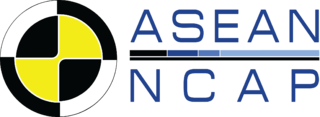
The New Car Assessment Program for Southeast Asia, or known as ASEAN NCAP, is an automobile safety rating program jointly established by the Malaysian Institute of Road Safety Research (MIROS) and Global New Car Assessment Program upon a collaborative MoU signed by both parties during the FIA Foundation Annual General Assembly in New Delhi, India on 7 December 2011.

The Perodua Axia is a city car produced by Malaysian automobile manufacturer Perodua. It was launched on 15 September 2014 as the successor to the Viva. The car takes over the title of being the most affordable car in Malaysia from the Viva, and the best-selling car in Malaysia for three consecutive years, between 2015 until 2017. The Axia is the first model to debut from Perodua's all-new second factory in Rawang, Selangor. As of mid-2023, the Axia reached 600,000 units sold since the launch of its first generation in 2014.

The Proton Iriz is a supermini (B-segment) produced by Malaysian automobile manufacturer Proton since 2014. It was unveiled on 25 September 2014 at Proton City by Malaysia’s fourth and seventh prime minister, Dr. Mahathir Mohamad. The Iriz platform is also used by its sedan equivalent, the Persona (BH) which was introduced in 2016.

Tan Chong Motor Holdings Berhad (MYX: 4405), also known as the TCMH Group or simply Tan Chong Motor (TCM) is a Malaysia-based multinational corporation that is active in automobile assembly, manufacturing, distribution and sales, but is best known as the franchise holder of Nissan vehicles in Malaysia. The company was founded in 1957 by two Malaysian entrepreneurs, Tan Yuet Foh and Tan Kim Hor, with ambitions of importing and selling Datsun cars from Japan. Tan Chong Motor Holdings Berhad was incorporated on 14 October 1972, and in 1974, the company was listed on the Kuala Lumpur Stock Exchange.
The automotive industry in Malaysia consists of 27 vehicle producers and over 640 component manufacturers. The Malaysian automotive industry is the third largest in Southeast Asia, and the 23rd largest in the world, with an annual production output of over 500,000 vehicles. The automotive industry contributes 4% or RM 40 billion to Malaysia's GDP, and employs a workforce of over 700,000 throughout a nationwide ecosystem.
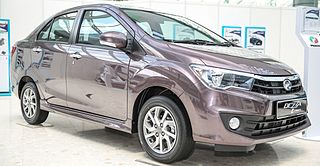
The Perodua Bezza is an A-segment sedan produced by Malaysian automobile manufacturer Perodua. It was launched on 21 July 2016 as Perodua's first sedan car, and a complement to the Axia hatchback.
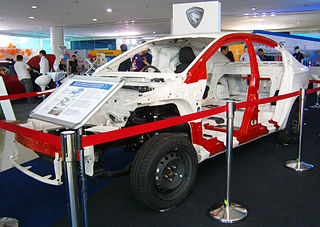
Reinforced Safety Structure (RESS) is the brand name of an automotive safety body construction system by the Malaysian carmaker, Proton. Debuting in 2012 with the Proton Preve, the RESS was developed to meet tougher global crash safety regulations through the application of heat treatment and hot press forming (HPF) technology.

















